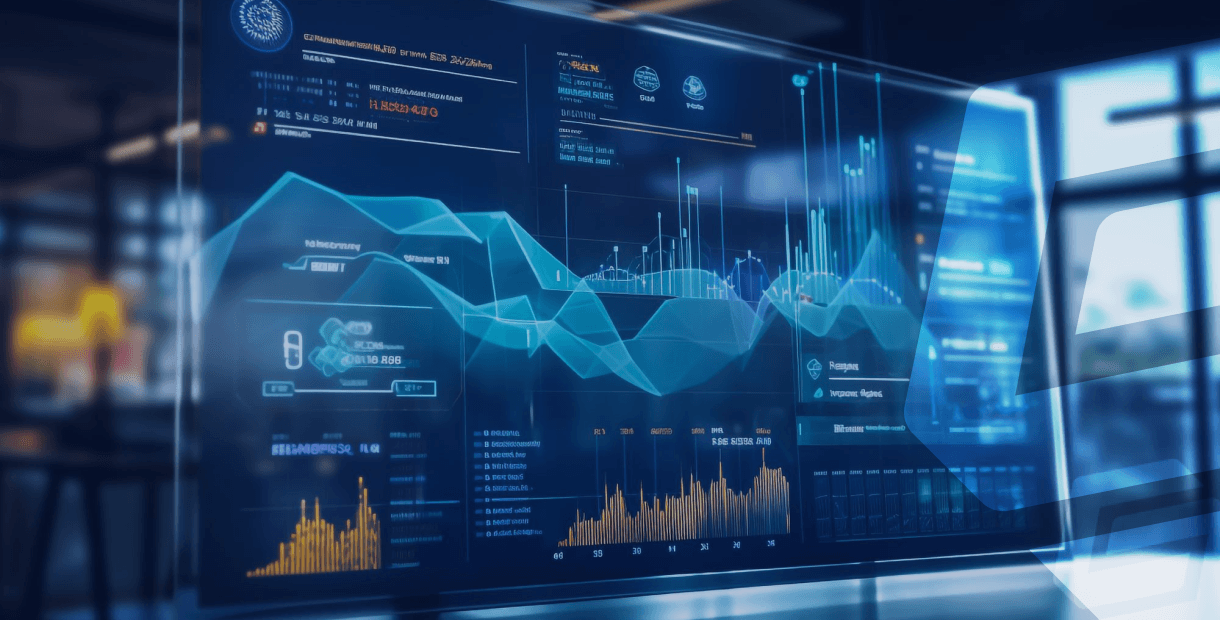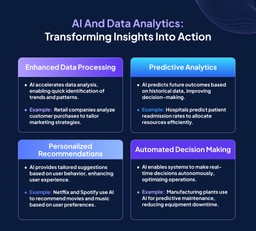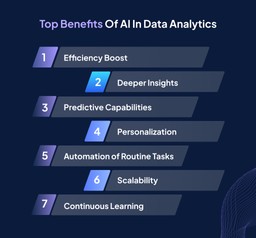Welcome to the world of data analytics, where we unravel valuable insights from heaps of information to make big impacts.
If you’re considering entering this field, buckle up because something exciting is on the horizon: artificial intelligence (AI) is teaming up with data analytics, and it’s a game-changer!
Imagine this: the AI market is on a rocket ride, poised to surge from roughly 241.8 billion U.S. dollars in 2023 to nearly 740 billion U.S. dollars by 2030.
That’s a monumental leap! But here’s the kicker: it’s not just about AI. It’s about how AI is teaming up with data analytics to revolutionize industries.
Now, let’s discuss how to ride this wave to career success.
Ever considered diving into a Data Analytics (DA) course?
Believe it or not, enrolling in a DA course can be your secret weapon in accelerating your journey in data analytics.
By mastering data analytics principles, you’ll refine your data analysis skills and gain a deeper understanding of data integrity and reliability—qualities that are absolute gold in the world of analytics.
So get ready to explore how this fusion of AI, data analytics, and DA can propel your career to new heights.
What’s the Connection Between AI and Data Analytics?
So, you might wonder: what’s the buzz about AI, and how does it mesh with data analytics?
Let’s break it down into digestible nuggets with some real-world examples:
Enhanced Data Processing
Machine learning algorithms can turbocharge data processing tasks, enabling analysts to sift through vast volumes of data at lightning speed.
For instance, imagine a retail company analyzing customer purchase patterns.
With AI, they can swiftly crunch through millions of transactions to identify trends and preferences, helping them tailor their marketing strategies accordingly.
Predictive Analytics
AI-powered predictive models take data analytics to a new level by forecasting future outcomes based on historical data.
Take the healthcare sector, for instance. Hospitals can leverage AI algorithms to predict patient readmission rates, allowing them to allocate resources more efficiently and improve patient care.
Personalized Recommendations
Ever noticed how streaming platforms like Netflix or music apps like Spotify seem to know your preferences so well?
That’s AI at work in data analytics! By analyzing your viewing or listening history alongside data from millions of other users, AI algorithms can serve personalized recommendations, keeping you hooked and engaged.
Automated Decision Making
AI can empower data analytics systems to make real-time decisions autonomously.
For example, let’s say you manage a manufacturing plant. By integrating AI with data analytics, you can deploy predictive maintenance algorithms that detect equipment failures before they occur, minimizing downtime and optimizing productivity.
In a nutshell, AI and data analytics are like two peas in a pod, complementing each other to unlock insights and drive innovation across industries.
With AI’s prowess in processing data, predicting outcomes, personalizing experiences, and automating decisions, it’s no wonder that integrating AI with data analytics is reshaping the future of work and opening up a world of possibilities.
Top Benefits of AI in Data Analytics
AI is a substantial investment for many businesses nowadays, showing an increase in benefits.
Now that we understand how AI and data analytics work together, let’s examine their perks.
Here are some top benefits:
Efficiency Boost
AI-powered algorithms can crunch through mountains of data in a fraction of the time it would take a human analyst. This means quicker insights and faster decision-making processes.
For example, in financial institutions, AI algorithms can swiftly analyze market trends and financial data to identify lucrative investment opportunities or detect potential risks.
Deeper Insights
AI can uncover hidden patterns, correlations, and trends within massive datasets that might go unnoticed by human analysts.
By leveraging advanced machine learning techniques, data analytics teams can gain deeper insights into consumer behavior, market dynamics, or operational inefficiencies.
For instance, in e-commerce, AI-powered analytics tools can analyze browsing behavior, purchase history, and demographic data to segment customers and tailor marketing strategies accordingly.
Predictive Capabilities
One of the most powerful aspects of AI in data analytics is its ability to predict future outcomes based on historical data. Predictive analytics models powered by AI can forecast everything from customer churn to equipment failures.
For instance, in the insurance industry, AI algorithms can predict the likelihood of claims being filed based on various factors like demographics, location, and past claims history, allowing insurers to adjust premiums accordingly and mitigate risks.
Personalization
AI enables hyper-personalized experiences by analyzing individual preferences and behaviors.
AI algorithms can analyze customer data in marketing to deliver targeted advertisements, personalized product recommendations, and tailored content. This enhances customer satisfaction and improves conversion rates and brand loyalty.
Automation of Routine Tasks
AI can automate repetitive and mundane tasks, allowing human analysts to focus on more strategic initiatives.
For instance, in HR departments, AI-powered tools can screen job applications, conduct initial interviews, and even analyze employee performance data to pinpoint training needs or predict attrition.
Scalability
AI-powered data analytics systems are highly scalable and can easily process massive volumes of data.
Whether analyzing petabytes of data in real-time or handling a sudden surge in user interactions, AI can scale up or down seamlessly to meet the demands of the task at hand.
Continuous Learning
AI algorithms can adapt and improve over time through constant learning from new data inputs.
This means that data analytics models powered by AI become more accurate and effective as they encounter more data, making them invaluable assets for businesses seeking to stay ahead in rapidly evolving markets.
Your Guide to Thriving in Tech Trends & Careers
Top AI Tools Used in Data Analytics
In the dynamic realm of data analytics, having the right tools at your disposal is essential for unlocking insights and driving innovation.
Here are some top AI data tools that are indispensable for data analysts:
- Python: Often hailed as the Swiss Army knife of programming languages, Python is a data analytics and AI powerhouse. With its extensive libraries, such as NumPy, pandas, and sci-kit-learn, Python enables data analysts to perform various tasks, like data manipulation, statistical analysis, machine learning, and visualization.
Its versatility and ease of use make it a favorite among data professionals for building AI-powered solutions.
- SQL (Structured Query Language): SQL is the go-to language for querying and manipulating relational databases. Data analysts rely on SQL to extract, transform, and analyze data stored in databases, making it an essential tool for data exploration and manipulation.
Whether it’s retrieving insights from large datasets or performing complex joins and aggregations, proficiency in SQL is a must-have skill for any data analyst working with structured data.
- ETL (Extract, Transform, Load) Tools: ETL tools play a crucial role in data analytics by facilitating the extraction, transformation, and loading of data from disparate sources into a centralized data warehouse or analytics platform.
Popular ETL tools such as Apache Spark, Informatica, and Talend streamline the data integration process, enabling data analysts to prepare and cleanse data for analysis efficiently.
These tools often incorporate AI-driven features such as automated data profiling, data quality checks, and predictive analytics to enhance data processing capabilities.
- Power BI and Tableau: Power BI and Tableau are leading business intelligence (BI) platforms that empower data analysts to create interactive visualizations, dashboards, and reports.
These tools enable users to uncover insights, track key performance indicators, and communicate findings effectively.
With AI-driven features such as natural language processing (NLP), anomaly detection, and predictive analytics, Power BI and Tableau enhance data visualization capabilities and facilitate data-driven decision-making across organizations.
Getting Started with AI in Data Analytics
Embarking on your journey into AI within data analytics can seem daunting, but fear not—there’s a roadmap to success.
Here’s how mastering AI tools and practicing them through projects can solidify your position in various roles such as business intelligence, market analysis, data analysis, Tableau Developer, and financial analysis:
Mastering AI Tools
Begin by familiarizing yourself with essential AI tools such as Python, SQL, and ETL platforms. Dive deep into Python libraries such as NumPy, pandas, and scikit-learn for data manipulation and machine learning.
Acquire proficiency in SQL for querying databases and performing data transformations.
Explore ETL tools like Apache Spark or Informatica for data integration and processing. By mastering these tools, you’ll lay a strong foundation for your AI journey in data analytics.
Practicing Through Projects
Apply your knowledge by working on real-world projects. Dive into hands-on exercises that simulate scenarios encountered in different industries.
This practical experience reinforces your understanding and demonstrates your capabilities to potential employers.
Specialize and Diversify
As you progress, consider specializing in specific areas of data analytics that align with your interests and data career goals.
Whether it’s business intelligence, market analysis, data visualization, or financial analytics, gaining expertise in niche domains can set you apart in the job market.
Career Transition Toolkit
Take a Course
Enrolling in a comprehensive data analytics course and gaining data certification can provide structured learning and guidance.
Look for courses that cover AI integration, practical projects, and industry-relevant skills. A well-designed course can accelerate your learning curve and provide you with the tools and knowledge needed to excel in the field.
Cementing Your Position
As you gain experience and expertise through projects, you’ll be well-positioned for diverse roles in data analytics.
Here’s how mastering AI tools and practicing through projects can solidify your position in various roles within data analytics:
- Business Intelligence Analyst: As a business intelligence analyst, you’ll be responsible for interpreting complex data sets to inform business decisions.
You’ll develop interactive dashboards and reports using tools like Power BI or Tableau to visualize key performance indicators, track business metrics, and identify trends that drive strategic planning and operational improvements.
- Market Analyst: Market analysts assess market conditions, consumer behavior, and competitive landscapes to identify growth opportunities and inform marketing strategies.
Leveraging AI tools, you’ll analyze large datasets to uncover market trends, forecast demand, and evaluate market performance, helping organizations gain a competitive edge and maximize market share.
- Data Analyst: Data analysts gather, process, analyze, and govern data to extract insights that inform decision-making across various business functions.
You’ll use AI tools such as Python, SQL, and ETL platforms to cleanse and transform data, conduct statistical analysis, and build predictive models to support business objectives.
Your analyses will drive operational efficiencies, optimize processes, and uncover actionable insights that drive business success.
- Tableau Developer: Using Tableau software, Tableau developers design and develop interactive visualizations, dashboards, and reports.
With proficiency in AI tools, you’ll leverage advanced analytics and machine learning techniques to enhance data visualization capabilities, providing stakeholders with actionable insights that facilitate data-driven decision-making and strategic planning.
- Financial Analyst: Financial analysts assess financial data, market trends, and investment opportunities to provide insights that guide investment decisions and financial planning.
By mastering AI tools, you’ll analyze historical financial data, build predictive models, and conduct scenario analyses to forecast future performance, assess risk, and identify investment opportunities that optimize returns and mitigate financial risks.
Is College
Worth It Anymore?
Start Your Data Analytics Journey with Syntax Technologies
Artificial intelligence (AI) integration has become a transformative force. AI empowers data analysts to unlock deeper insights, predict future trends, and automate decision-making processes.
By harnessing AI tools and techniques, data analysts can analyze vast amounts of data quickly and accurately, driving innovation and enabling data-driven decision-making across industries.
In pursuing a successful career in data analytics, Syntax Technologies offers the perfect roadmap to achieve your goals.
Our comprehensive course covers essential topics such as Python programming, SQL database management, ETL processes, and AI integration in data analytics.
What sets us apart is our focus on practical learning. Through interactive projects and real-world applications, you’ll gain hands-on experience in solving complex data challenges using AI tools and techniques.
Our experienced instructors provide personalized guidance to ensure your success.
Join us at Syntax Technologies and kickstart your journey to a rewarding career in data analytics.
Let us equip you with the skills, confidence, and expertise to excel in this dynamic field and make a meaningful impact in your career.



